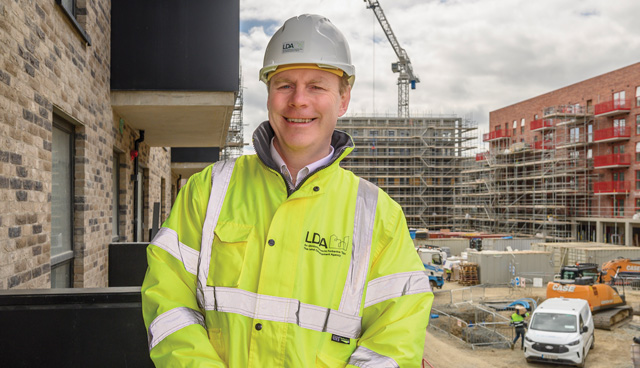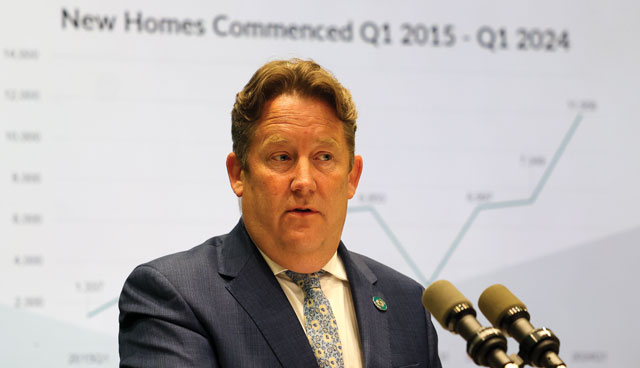
Cover story: A partnership approach
4th July 2024
Housing Ireland Magazine 2024 / 2025 Foreword
8th July 2024Housing Minister Darragh O’Brien TD: ‘What we are doing is radical’

Less than a week after the Report of The Housing Commission was published, Minister for Housing, Local Government and Heritage, Darragh O’Brien TD – the longest serving Housing Minister since Noel Dempsey – meets with Ciarán Galway to discuss its contents, as well as the broader context of housing policy and delivery.
Ciarán Galway (CG): Approaching three years since the launch of Housing for All, what are your most significant priorities as Minister for Housing?
Darragh O’Brien (DO’B):
To build on the progress that we have made already. When I took over as Minister, we were in a situation where there were less than 20,000 homes delivered per year and we had 10 years of very significant undersupply. In the first two years of Housing for All, we have exceeded the target substantially and we have built 110,000 new homes at the end of Q1 this year [2024].
Our priority is to accelerate that progress, keeping a strong focus on social housing delivery. We are now building more social homes annually than we have done in over 50 years. Also important is ensuring that the first-time buyers supports continue and accelerate. We have close to 600 first-time buyers per week now purchasing homes and we are very pleased with the progress, particularly in the First Home Scheme, which is a scheme many people were critical of at the start. It is really working, with around 10,000 registrations and over 5,000 approvals.
We have a full year this year [2024] to build on the progress; to exceed the target of 34,500 homes that we have set. We have accelerated our commencements and completions, and we are going in the right direction. There are still lots of challenges, but I think by any fair assessment, really significant progress has been made.
“The main opposition party… has yet to publish a housing plan and we are four years into Government.”
Darragh O’Brien TD, Minister for Housing, Local Government and Heritage
CG: To what extent has it become more affordable to own or rent a home in this State?
DO’B: The private rental market is still a significant issue because of a lack of supply, but cost rental – state-backed affordable rents for working people – is really working. We have close to 4,000 units approved under that scheme. That tenure did not even exist until just over two years ago when I legislated for it but now, we have literally thousands of people living in cost rental homes. It is working, particularly in apartment developments, and we are seeing apartments being built with cost rental in mind.
To deal with the affordability of rent first, we need to see a further expansion of cost rental, and the stabilisation of the private rental market.
In relation to house purchase, it is making sure we direct the supports that we have to the individuals and the families based on what is affordable for them. We are now seeing first-time buyers buy homes at a rate not seen since 2006.
Coupled with that though, I want to see accelerated delivery on the local authority-led affordable purchase schemes. Just short of 5,000 homes have been approved through the Local Authority Affordable Purchase Scheme.
Additionally, the Project Tosaigh scheme has been a bit of a game changer for the Land Development Agency because they will deliver 5,000 homes between now and 2026. Between this year and last year they will deliver well over 2,000 units and all of them are affordable and social.
So, it is good; it is improving, but does everyone feel that yet? No, they do not – I am meeting with people all the time – but they have much greater option now.
CG: To what extent do you think that the delivery of government’s housing strategy, via a multitude of schemes, is adequately understood by the public?
DO’B: If there was one single scheme that would resolve housing, you would bring in one scheme, but housing is complex, and it needs different responses in different areas.
The State is the biggest actor in the housing market now [investing] over is €5 billion this year [2024]. If the State was not providing that, I would not be talking to you about housing completions in the high 30,000s. We would probably be talking about 20,000 completions. That is the level of intervention the State has had to make, and rightly so.
The level of understanding on the first-time buyer side has greatly improved, though people do need to get under the bonnet and look at the schemes. The First Homes Scheme is very easily understandable, and we are actually approving double the rate of what we were in Q4 2023 in Q1 2024.
There is greater awareness of the schemes that are there through affordablehomes.ie – one portal for all affordable homes makes a big difference – and we have got to keep getting the message out there. It is not one and done. The public awareness still needs to improve.
CG: What is your assessment of the Report of The Housing Commission?
DO’B: Firstly, I set up The Housing Commission. It was a Programme for Government commitment because I wanted an independent view of what housing would look like in 10-, 15-, to 20-years’ time.
“I would contend that what we are doing is radical.”
Across the 83 recommendations, about 70 per cent of them are either done or we are doing. Take the one we have just discussed on affordable housing; John O’Connor has said very clearly, as Chair of the Commission, that we should continue the work that government is doing on affordable housing, consistency is what is important, and we should “stick with it”.
Now, what I would say in relation to Deputy [Eoin] Ó Broin is that that is in stark contrast to the main opposition party [Sinn Féin], which has yet to publish a housing plan and we are four years into Government.
I have written to Eoin [Ó Broin] on a couple of occasions asking him to provide me with his housing plan – and if he will not do that – to provide the independent analysis of what impact the removal of the First Home Scheme, the Help to Buy scheme, and the Vacant Property Refurbishment Grant – all of which he is opposed to – would have on the ability of people to buy homes, as well as what it would do to housing delivery and building homes. The development sector has said it would be catastrophic. The people I am most concerned about are the ones who are buying homes.
They [Sinn Féin] have not produced a housing plan. Now, he [Eoin Ó Broin] told the Sunday Independent 16 months ago that he was just about to publish it and he has not. People see Housing for All, and they can criticise it, they can support it – and many do. People know what money we are putting behind it. On the other side, you have Eoin standing on the ditch opposing it all but not saying what he would do.
I have the responsibility to actually do things – not just to talk about them. People will judge what I have done based on the results that we are getting. But I do think it is important that he [Ó Broin] publishes a plan and allows it to be open to independent analysis. But he will not.
CG: You mentioned [Chair of The Housing Commission] John O’Connor’s comments regarding consistency. How do you balance that message with The Housing Commission’s call for a “radical strategic reset of housing policy”?
DO’B: If you talk to The Housing Commissioners themselves, they were looking forward. To be fair to the Commission, they spent the guts of three years compiling the report and it deserves more than three weeks of consideration. I have said I will examine their recommendations in the report in detail. I have read it and gone through it – we will see what we can proceed with.
Some areas that I have said already that, at first glance, I do not see us proceeding with include the setting up of another layer of housing delivery in the form of a Housing Delivery Oversight Executive that will sit above all departments and agencies. At first look, that is not something that I will support. I think it will add another layer to housing delivery, but I appreciate that you have a commission from very diverse backgrounds that have put a report in on many different things that have not got coverage yet.
If you look at the social housing and affordable housing side, they recommend that all new schemes should have a 20 per cent social and affordable allocation. I have actually done that already. I legislated for that two years ago. I reversed the changes that [then-Housing minister] Deputy Alan Kelly made in reducing the Part V provision from 20 to 10 per cent. I reversed it back to 20 and actually went further than that and said that in the LDA’s delivery in Cork and Dublin has to be 100 per cent social and affordable.
I do think that we need to always be radical in our thinking and I would agree with The Housing Commission on that. I do not see it as an endorsement of pure radicalism for radicalism’s sake.
We have talked about the First Home Scheme – it never existed before. It brought about such commentary because it was a radical step and a radical step that has worked and is working. Cost rental did not exist – it is in place now. The LDA had not built a house when I came in [to the Department] and had no money and no legislation. It is now delivering hundreds [of homes]; well over 1,000 this year. I would contend that what we are doing is radical.
We still have lots of challenges, so I am not going to give the impression that everything is sorted, it certainly is not. We were never going to sort it in three years of Housing for All, but what we have done is built a real foundation to move on from. Do we need to do more? Yes.
I got the report on the 8 May, but in fairness, when part of the report was leaked, it was only fair that people saw the report in the round. I still need to consider it. We have not fully assessed what we will do with each recommendation, and it deserves that recognition.
CG: Moving onto the first revision of the National Planning Framework (NPF), you previously indicated that it would be published by Q1 2024, now it has moved to autumn 2024. What is the revision’s current status?
DO’B: We are actually going to put it out in draft and there is a reason for that – the census [2022] was late because of Covid. We need to have all the census data because that feeds into the ESRI report and the NPF review and we need to look at both in the round. I expect the draft NPF to be published in June [2024] and we will put it out for public consultation – which is right and proper – probably for four weeks – if it is ready. I think it will be ready in June, and I want it implemented in September.
CG: What are your thoughts on how that is going to inform the coming update of Housing for All?
DO’B: It feeds into the work that the Commission has been doing, the ESRI is doing – which is not concluded yet – and the NPF review. Since Housing for All was published, targets have never been the ceiling, they have been the floor. So, while some of the commentariat and opposition are talking about targets on housing, we are getting on with building the houses. We exceeded the [overall] target in 2023, we exceeded it the year before, and we intend to exceed it this year.
It does not stop the work that we are doing, but it is important that we reset based on the increasing population and with population trends. The NPF will underpin that. More than likely, we will be asking local authorities to revisit their development plans to zone more appropriate lands for additional housing delivery. Based on an end-of-September timeframe, I will have written to all the local authorities to let them know that.
CG: It is fair to say momentum is building, with Housing for All exceeding its overall delivery targets, but why has it struggled to meet new build social delivery targets for two years consecutively?
DO’B: If you look at last year [2023], we built over 8,100 new build social homes, up from about 5,000 the year before, so it was a big jump from the previous target. It did not hit the new build target of 9,100 and one of the reasons for that, was the issues we had post-outbreak of the war in Ukraine on supply chain and on increased costs.
We had to work very hard to make sure our projects continued, and [then-Finance Minister] Michael McGrath did a really good piece of work in relation to the Inflation/Supply Chain Delay Co-operation Framework Agreement. We had a lot of schemes stalled because one, they could not get materials, and two, the costs had gone through the roof. Some want to just dismiss that and pretend that it did not happen.
CG: The Government has agreed to extend the RPZ rent caps to 2025. Why did it take that decision?
DO’B: The RPZs had a sunset clause. I inherited the RPZs. They had a rental increase ceiling of 4 per cent and when I came in [as Minister], I changed it to 2 per cent.
The reason I extended the RPZs for one year is because we are in the middle of the Review of the Private Residential Rental Sector. They [RPZs] were due to end at the end of this year [2024]. I did not want a cliff edge, so we put it onto the end of 2025 to give certainty for the renter.
The recommendations from The Housing Commission are interesting. I know some commentators gave them a guarded welcome and said they would be complicated and there is a complexity in relation to tagging rents in different areas. It is something that deserves consideration and I am going to be asking for it to be included in the Review of the Private Residential Rental Sector because it will be the next government who will make the decisions around what replaces RPZs.
But what I really did not want was RPZs to just end this year and then anyone could set rents at any level. There is no way that I wanted that. I announced it in early May so that tenants and landlords are abundantly clear that the status quo remains until 2025. That is the right way to do it.
CG: When will the Review of the Private Residential Rental Sector be published?
DO’B: I am going to feed the Commission’s recommendation into it [the review]. The Commission has obviously put an awful lot of thought into how they would look at pricing in the rental market and setting rents. It will be Q3 this year.
CG: Would you like to continue as Housing Minister, if it is possible, in the next government?
DO’B: I have always said I would love to. It is busy and it is challenging but I love it and if I were fortunate enough to be re-elected in my own area of Dublin Fingal East as it is now, and I was asked to serve as Housing Minister again, I would be delighted.
CG: To what extent will the coming general election be won or lost on housing policy?
DO’B: I, my party, and this government will be able to point to real delivery. I have never said that we will have every issue in housing resolved and it will not be. There will still be people who have housing needs that need to be met but what we will be able to show is a plan that we have published, we are implementing it, and it is having a positive effect.
Housing will be central, I would imagine, amongst a number of matters because it is very important for individuals who are on social housing lists, for people who are working and want to buy for their families, and for those who do not have a home. I am looking forward to those debates.
I am also looking forward to when any alternative [plan] will be published, so that we can actually critique and look at the alternatives. If any party is of the view that they believe that they should be elected and form the next government, I think at the very least they should publish a housing plan and let people have a look at what they are going to do.








